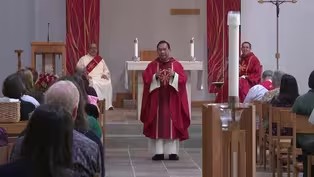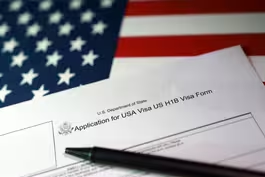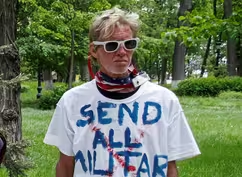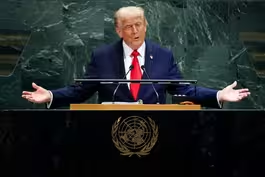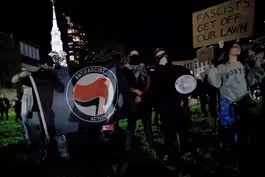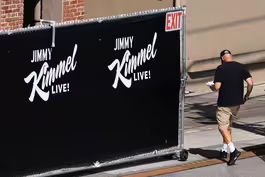
New book offers a personal and historical take on violence
Clip: 9/23/2025 | 8m 47sVideo has Closed Captions
'A Thousand Ways to Die' offers a personal and historical take on the impact of violence
Pulitzer Prize-winning journalist Trymaine Lee has spent his career chronicling the daily toll of violence and inequality. In his new book, he blends journalism with personal narrative to show how racism, trauma and violence cut lives short and carry on across generations. Geoff Bennett sat down with Lee to discuss "A Thousand Ways to Die: The True Cost of Violence on Black Life in America."
Problems playing video? | Closed Captioning Feedback
Problems playing video? | Closed Captioning Feedback
Major corporate funding for the PBS News Hour is provided by BDO, BNSF, Consumer Cellular, American Cruise Lines, and Raymond James. Funding for the PBS NewsHour Weekend is provided by...

New book offers a personal and historical take on violence
Clip: 9/23/2025 | 8m 47sVideo has Closed Captions
Pulitzer Prize-winning journalist Trymaine Lee has spent his career chronicling the daily toll of violence and inequality. In his new book, he blends journalism with personal narrative to show how racism, trauma and violence cut lives short and carry on across generations. Geoff Bennett sat down with Lee to discuss "A Thousand Ways to Die: The True Cost of Violence on Black Life in America."
Problems playing video? | Closed Captioning Feedback
How to Watch PBS News Hour
PBS News Hour is available to stream on pbs.org and the free PBS App, available on iPhone, Apple TV, Android TV, Android smartphones, Amazon Fire TV, Amazon Fire Tablet, Roku, Samsung Smart TV, and Vizio.
Providing Support for PBS.org
Learn Moreabout PBS online sponsorshipGEOFF BENNETT: Pulitzer Prize-winning journalist Trymaine Lee has spent his career chronicling the daily toll of violence and inequality.
In his new book, the MSNBC contributor blends deeply reported journalism with personal narrative to show how racism, trauma and violence cut lives short and how families can carry that loss across generations.
I recently spoke with him about the book "A Thousand Ways to Die: The True Cost of Violence on Black Life in America."
Trymaine Lee, it's great to see you.
TRYMAINE LEE, Author, "A Thousand Ways to Die: The True Cost of Violence on Black Life in America": Likewise.
Thanks for having me.
GEOFF BENNETT: Of course., You begin this book in a deeply personal place, your own heart attack at the age of 38.
Why decide to start there and really frame this narrative through your own brush with mortality?
TRYMAINE LEE: Before the heart attack, which was seven years ago this summer in July, I was writing a book about the true cost of gun violence in terms of actual dollars as a way to speak to the broad cost that families and communities touched by gun violence pay every single day.
But that day when I had my own brush with death with that heart attack, it really began a journey to really widen the aperture on what violence really is.
And so I describe in the book a blood clot and a bullet are very different things, but both have the ability to take, twist and shred a life.
And both come from these impulses, these very American impulses in the way we have experienced trauma and the way we continue to carry it, especially the way violence manifests in our bodies.
GEOFF BENNETT: On that point, I mean, you also write about your uncle's murder and the long shadow it cast over your family.
How did that loss really capture the generational reality of how trauma can get carried forward?
TRYMAINE LEE: Yes, I think, in one way, it was wild for me to really get my arms around the idea that I exist because of an act of gun violence.
My great-uncle Cornelius was 12 years old when my great-grandparents and my grandmother lived in rural Jim Crow, Georgia.
And his murder sent my family into the waves of the Great Migration, where later on my grandmother would meet my grandfather and the rest would be history.
But the idea that we have carried this burden of violence from the Jim Crow South and the kind of violence we saw from white supremacists and Jim Crow segregation that followed us up into the North, with the hope and expectation that we'd be beyond the specter of violence, but time and again we'd find it.
And so I think my family, just like so many other families in this country hoping and seeking better days and better opportunities, have still had violence and the bullet nipping at our heels.
GEOFF BENNETT: Well, tell me more about that, the ways in which trauma and violence really imprint on the body.
TRYMAINE LEE: Yes.
So there's this thing called epigenetics.
And the idea is that, when you experience certain kind of violence and trauma, that it recodes a little bit of your DNA and you pass it on.
And so there is a lot of research being done around that idea.
But I also think there's a psychic residue how we respond to trauma and also pass that trauma on.
It's inherited, the way you raise your kids, the way you move through society, your hypervigilance, your expectation that around any corner that violence could strike again.
And what does that do in limiting your dreams and your possibilities, the imagination of what life can be?
And for Black people in this country, who've experienced it, again, from kind of the white supremacist violence to the violence of community, but also the violence that's requisite, the systemic violence that's required before a trigger is ever pulled.
What does it mean to have lack of access to quality health care or food or water, right?
What does it mean to every day have that pang and the anxiety and anxiousness?
That's all a form of violence born often from the bullet.
GEOFF BENNETT: That in many ways is the most provocative part of this book.
You trace the ways in which the gun has long been used to keep Black communities in control.
Walk us through that history.
TRYMAINE LEE: Yes.
I think one of the biggest discoveries that I made in writing this book, and it could also be a book in of itself, is, even before enslavement, the relationship between Black people and guns goes back to the time of enslavement in Africa.
And so many of us understand that enslaved people were some byproduct of wars and that Europeans just took advantage of this waiting labor force, when, in reality, what we see, what the research shows is that, as gun technology is rising, European powers were plying regional African powers with guns and munitions to foment more unrest and create more war, to create the enslaved.
And so the idea that our bodies, our physical selves were bartered for weapons, bound to them in some pretty real ways, and that we were forced out of Africa with the muzzle of a flint-like rifle flower backs, and then we enter the Western world, where there will be more white men with guns, where, in certain communities, in certain counties, white men were required to be gun owners to patrol Black people, and these were the earliest predecessors of the police department.
And so bound to the gun from Africa, the psychic residue of what that means to be forced out of your homeland, to arrive in an alien, foreign world, right, and experience the violence that keeps this society bound, it keeps us in our place.
There's zero way to me that we haven't carried that on.
GEOFF BENNETT: How did you come to understand through your reporting for this book acts of violence not as isolated incidents, but as part of a systemic crisis?
TRYMAINE LEE: Yes, I mean, in some ways, when you look at the nature of the way we have been forced into certain communities -- and I think this is probably how we arrive at the modern context of gun violence in urban communities, is that, as people were fleeing the South, generations, millions of people into the waves of the Great Migration, finding solace in Baltimore and Chicago and D.C.
and New York, cordoned off in specific communities that were -- they had red lines drawn around them, so decreasing the value of your homes, decreasing the opportunity to build wealth, who you could buy and sell from.
In certain places, there was these things called a deed of covenant that it was written into the deeds that if you were a white person, you could not sell to a Black person, so all this compounding violence of economic dispossession, creating the perfect ecosystems for violence to occur.
And it wasn't just in Chicago.
It was in D.C.
and Baltimore and Camden, New Jersey, throughout this country.
And that level of disinvestment, again, creates the perfect formula for folks to not just experience the violence of the gun, but all that turmoil within.
GEOFF BENNETT: What do you want readers to take away from this book in terms of the connections among generational trauma, systemic racism, health outcomes?
TRYMAINE LEE: I think look no further than the president's words in discussing the threat of occupying certain cities.
And he said, it doesn't matter if it's five years or 10 years.
These people are born to be criminal.
There's this idea that Black Americans are somehow inherently violent.
And, to me, that means inherently other, right?
And so I think, when we look at the news and we see another young Black man shot and killed in the news, and we see their family members crying and wailing and pleading for Jesus or policy or someone to help them, that we understand this is part of a broad continuum that we have experienced from the beginning.
But for Black people, in particular and families who have experienced this, I think it's important to name the trauma and point to the trauma, so we can begin to unpack it ourselves, because without the information in this book and with those gaps in history and the gaps of understanding, I think some of us also fill in the blank to say it must be us.
But it's so far beyond us.
GEOFF BENNETT: You know, Trymaine, I believe and I know you do too that any conversation about Black trauma has to make space for its counterbalance, which is joy and resilience.
TRYMAINE LEE: That's right.
GEOFF BENNETT: And you shine a light on resilience in this book.
Where do you find the most hope in the communities that you cover?
TRYMAINE LEE: You know, I think it's with the youth.
On one hand, it's so sad that we lose so many young people to gun violence.
But when we have the precarity of life in one hand and the preciousness and joy in the other, that's a very difficult balance.
But the pain hurts so bad because of the joy and because of the opportunity and possibility.
This book really began when my daughter asked me after my heart attack: "Daddy, how and why you almost died?"
And I chose to be vulnerable and open and honest with her.
And in telling that story to her, it's given her the agency to write our own narrative.
And while there are 1,000 ways to die, there are even more ways to live.
And so I'm hopeful, even though we lament the condition that young people find themselves in and the violence they experience, I do believe that they will carry us through.
And it's -- like, it's a wonder of how many of us were killed in this country as Black people, but it's even more of a wonder how many of us survived and what it takes to survive.
And so, even though this book is weighty, it shines a light in a very dark place.
At the end of the day, I think it's empowering that we have the agency to tell our own stories.
GEOFF BENNETT: Trymaine Lee, I always enjoy speaking with you, the book, "A Thousand Ways to Die: The True Cost of Violence on Black Life in America."
Thank you for being here.
TRYMAINE LEE: Thank you, Geoff.
American bishop emerges as a new voice of the church
Video has Closed Captions
Clip: 9/23/2025 | 7m 59s | First American bishop appointed by Pope Leo emerges as a new voice of the Catholic Church (7m 59s)
How changes to H-1B visas could impact American businesses
Video has Closed Captions
Clip: 9/23/2025 | 8m 21s | How H-1B visa changes could impact American businesses and workers (8m 21s)
Man convicted of trying to assassinate Trump at golf course
Video has Closed Captions
Clip: 9/23/2025 | 3m 43s | Man convicted of trying to assassinate Trump at Florida golf course last year (3m 43s)
Trump suggests Ukraine could reclaim territory from Russia
Video has Closed Captions
Clip: 9/23/2025 | 7m 1s | Trump suggests Ukraine could reclaim territory from Russia (7m 1s)
What is antifa and why Trump calls it a terrorist group
Video has Closed Captions
Clip: 9/23/2025 | 4m 16s | What is antifa and why Trump wants to label it a terrorist organization (4m 16s)
Why some stations won't air Kimmel's return to late night
Video has Closed Captions
Clip: 9/23/2025 | 6m 21s | Why some stations won't air Jimmy Kimmel's return to late night (6m 21s)
Providing Support for PBS.org
Learn Moreabout PBS online sponsorship
- News and Public Affairs

FRONTLINE is investigative journalism that questions, explains and changes our world.

- News and Public Affairs

Amanpour and Company features conversations with leaders and decision makers.












Support for PBS provided by:
Major corporate funding for the PBS News Hour is provided by BDO, BNSF, Consumer Cellular, American Cruise Lines, and Raymond James. Funding for the PBS NewsHour Weekend is provided by...
